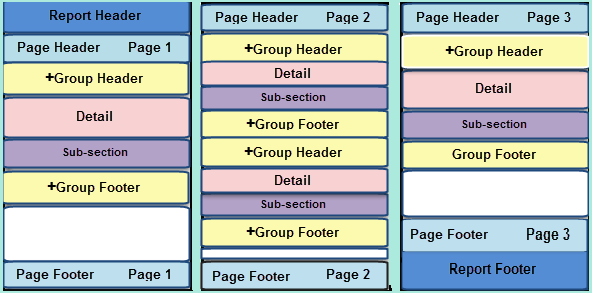- FlexReport for WinForms Overview
- Key Features
- FlexReport versus other Reporting Controls
- Core Classes
- Design-Time Support
- Quick Start
- FlexReport Designer
- FlexReportDesigner Control
- Data Binding
- Load Reports
- Create Reports
- Sections of FlexReport
- Fields and Custom Fields
- Modifying the Fields
- Parameters
- VBScripting with ExpressionEditor
- Filtering Data
- Grouping Data
- Sorting Data
- Customize Reports
- Styling the Reports
- Export Reports
- Preview and Print Reports
- Deployment
- FlexViewer
Sections of FlexReport
A flexreport or a .flxr file is divided into sections. You can open a report in the FlexReportDesigner app to view its sections. Every report consists of basic sections such as, Report Header, Page Header, Group Header, Detail, Group Footer, Page Footer, Report Footer and Sub-section.
The report sections help in partitioning the report vertically. Based on their type (for example, Page, Group, Sub-Section etc.) they arranged by default at specific places within the report.
The following diagram shows how each section is rendered on a typical report. It also displays how a sub-section in the Detail section is rendered in the report:

To create user-friendly reports, you need to understand how each section works. Let us explore each section in the order they appear on the report.
Report Header
The first section rendered is the Report Header. It appears only once, in the beginning of a report. This section usually contains information that identifies the report.
Page Header
After the Report Header, comes the Page Header. If the report has no groups, this section usually contains labels that describe the fields in the Detail Section.
Group Headers and Group Footers
The next sections are the Group Headers, Detail, and Group Footers. These are the sections that contain the actual report data. Group Headers and Footers often contain aggregate functions such as group totals, percentages, maximum and minimum values, and so on. Group Headers and Footers are inserted whenever the value of the expression specified by the GroupBy property changes from one record to the next.
Detail
The Detail section contains data for each record. It is possible to hide this section by setting its Visible property to False, and display only Group Headers and Footers. This is a good way to create summary reports.
Page Footer
At the bottom of each page is the Page Footer Section. This section usually contains information such as the page number, total number of pages in the report, and/or the date on which the report was printed.
Report Footer
Finally, the Report Footer section is printed before the last page footer. It appears only once, towards the end of a report. This section is often used to display summary information about the entire report.
Sub-section
The Sub-Section can be added to any section of a report; by default it gets added at the bottom of the section that is currently selected. This section contains the additional data that enhances the data present in its parent section. A section’s height is determined by the sum of heights of its sub-sections.
Customized sections
You can determine whether or not a section is visible by setting its Visible property to True or False. Group Headers can be repeated at the top of every page (whether or not it is the beginning of a group) by setting their Repeat property to True. Page Headers and Footers can be removed from pages that contain the Report Header and Footer sections by setting the PageHeader and PageFooter properties on the Layout object.
type=note
Note that sections can be made invisible, but they cannot be added or removed, except by adding or removing groups.


